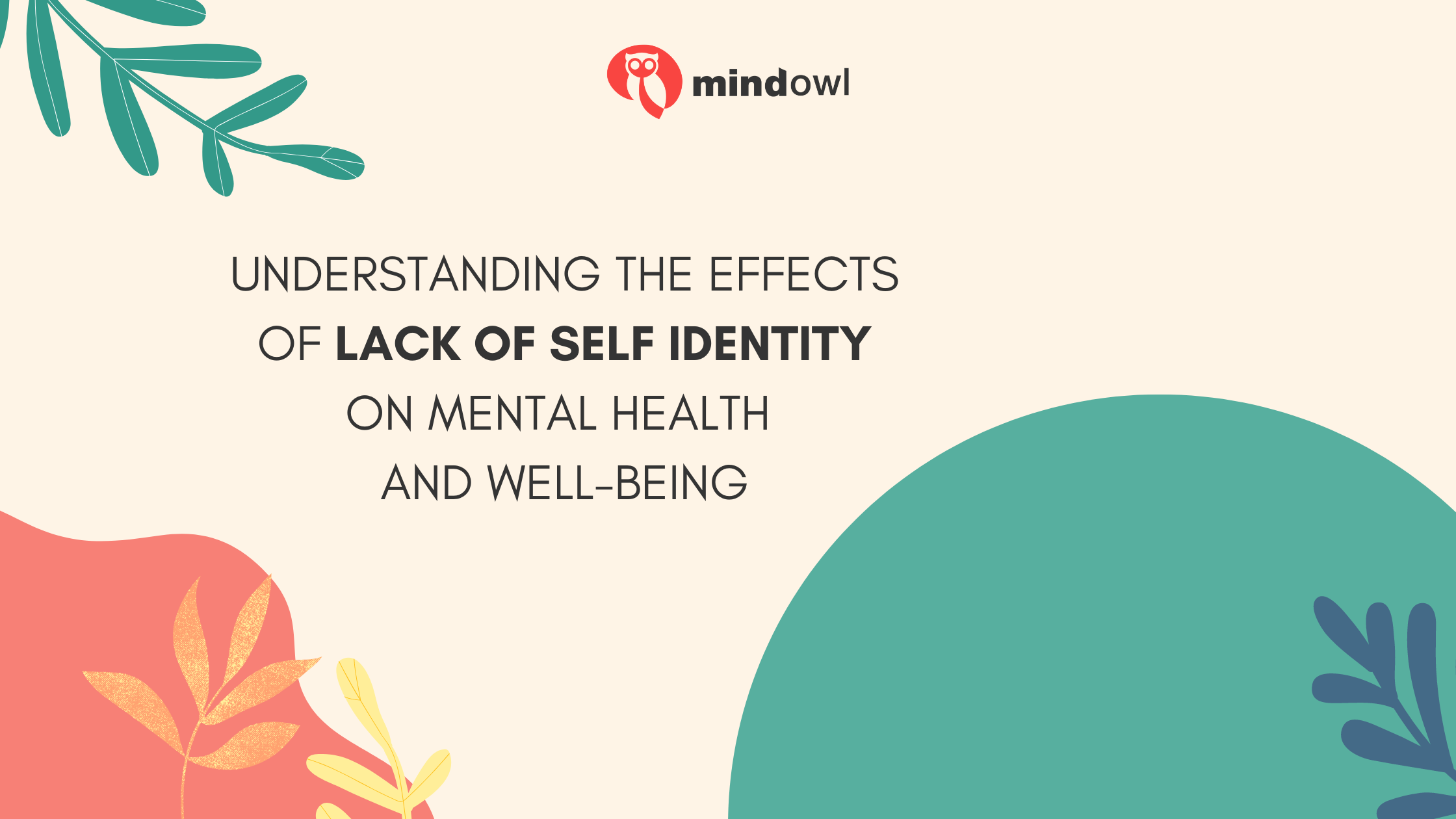Are you feeling lost, unsure of who you truly are? A lack of self-identity can significantly impact your mental health causing anxiety and insecurity. In this article, we’ll delve into what a sense of self is, its importance for our well-being and how to strengthen it to lead fulfilling lives.
Excited? Join us as we explore the world within!
Key Takeaways
- Lack of self-identity can negatively impact mental health, causing anxiety and low self-esteem.
- Signs of lacking self-identity include feeling lost or aimless, high stress levels, being like a chameleon, mood swings, lack of purpose, and low self-esteem.
- Relationship issues and Borderline Personality Disorder (BPD) are common causes of lacking a sense of self-identity.
- Effects of lack of self-identity on mental health include increased levels of anxiety, low self-esteem, social isolation, and feelings of being lost or aimless.
- Ways to improve self – identity include exploring values and beliefs, seeking therapy or support groups, and engaging in activities that bring joy.

What is Self-Identity?
Importance of having a sense of self
Knowing who you are is very important. It helps you make good choices in life. If you understand yourself, it’s easier to know what makes you happy. You can set goals that fit with who you are.
This leads to feeling happy and full of purpose in life. People with a strong sense of self trust their own judgement. They also feel confident about themselves! Good mental health often goes hand in hand with knowing who we are too! Especially among young folks, those who have a clear sense of self cope better with stress and problems.
Signs of lacking a sense of self-identity
Knowing the signs of missing self-identity can help us take action. These signs include:
- Feeling lost or aimless: This shows you are struggling to know where you fit in the world.
- High stress levels: Too much worry may be because you’re not clear about who you are.
- Being like a chameleon: Changing yourself based on who you are with is a big sign.
- Mood swings: If your moods change fast, it might be because of low self-identity.
- Not having a sense of purpose: You might feel like life doesn’t have a point if you lack self-identity.
- Low self-esteem: This means you have a bad idea about yourself and it’s linked to identity issues.
Causes of Lack of Self-Identity

Relationship issues and Borderline Personality Disorder (BPD) are two common causes of lacking a sense of self-identity.
Relationship issues
Issues in relationships can lead to a loss of self-identity. People might start to feel unsure about themselves. This is often seen in those who depend too much on their partners for happiness and approval.
They may forget their own needs, likes, and dislikes. This low sense of self creates big problems within the relationship itself. Such issues may also result in poor mental health over time.
Borderline Personality Disorder (BPD)
BPD is a mental health problem. It makes people feel emotions very strongly, and to change their moods very quickly. This can make friendships hard because feelings about others can flip from love to hate fast.
People with BPD often don’t have stable ideas of who they are or want to be. They may view themselves differently at different times, causing an identity crisis. This condition also leads to scary mood swings which can affect everyday life in big ways.
A person’s work, home life and sleep can all suffer due to BPD.
Addressing the lack of self-identity with Dialectical Behavior Therapy
Dialectical behavior therapy (DBT) was specifically developed to treat borderline personality disorder, which includes identity disturbance as a core diagnostic criterion. DBT uses validation strategies to strengthen a positive self-concept and skills training to build emotional regulation abilities that support a stable identity.
Research shows DBT increases self-concept clarity and improves facets of self-esteem like self-regard and social confidence in people with BPD. By stabilizing emotions and building a coherent identity, DBT seeks to alleviate identity issues that often underlie various mental health struggles.
Here is a summary of key points about DBT therapy and its effects on identity and self-concept:
- DBT has been shown to significantly improve identity development and reduce identity diffusion in adolescents with emotional dysregulation or borderline personality disorder symptoms. It helps stabilize emotions and build a more coherent identity.
- DBT utilizes validation strategies to enhance patients’ sense of self and self-concept clarity. Skills training also aims to reduce dysfunctional behaviors that interfere with identity development.
- Research found DBT resulted in enhancements in self-concept clarity and facets of self-esteem like self-regard and social confidence in women with borderline personality disorder. This suggests DBT improves the DSM identity disturbance criterion.
- DBT skills like mindfulness, distress tolerance, emotion regulation, interpersonal effectiveness, and radical acceptance can help people struggling with identity issues better understand themselves, cope with difficult emotions, set boundaries, and build self-worth.
- By stabilizing emotions and building life skills, DBT seeks to alleviate identity disturbances that often underlie various mental health issues. Developing a stronger sense of self is seen as key to improving wellbeing.
Developing a stronger sense of self through DBT’s mix of skills training and validation techniques can be an important part of improving mental well-being for many people struggling with identity issues. A clear and consistent identity is an important foundation for emotional stability.
 Self-identity refers to a person’s understanding of themselves – their beliefs, values, interests, and unique characteristics.
Self-identity refers to a person’s understanding of themselves – their beliefs, values, interests, and unique characteristics.
Effects of Lack of Self-Identity on Mental Health and Well-being
Lack of self-identity can have detrimental effects on mental health and overall well-being, leading to increased levels of anxiety, low self-esteem, social isolation, and feelings of being lost or aimless.
Increased levels of anxiety and low self-esteem
Not having a strong sense of self can lead to more worry and low self-esteem. These feelings are common when people don’t know who they really are. This issue often ties to mental health problems.
For example, stress over grades affects how students feel about themselves. They may start feeling down or worried all the time. Online chats and posts can add to these bad feelings, too.
Also, teens going through big life changes might get hit hard by these issues, especially if they also have tough living conditions or face hurtful actions from others.
Social isolation and feeling lost or aimless
Being alone too much can harm our mental health. It links to problems like worry, low self-belief, and sadness. Also, feeling lost or aimless means you don’t feel a sense of meaning in life.
These feelings may be signs of an identity crisis. This happens when people aren’t sure about themselves or their place in the world. Such feelings can make us feel very lonely and add stress to our lives. For individuals aiming to understand themselves better in pursuit of mental health and educational goals, exploring an pre-nursing degree online can be a significant step. Identifying a career path aligned with personal values can strengthen self-identity and contribute to one’s overall sense of purpose.
How to Find Yourself and Improve Self-Identity
Explore your values and beliefs, seek therapy or support groups, and engage in activities and hobbies that bring you joy.
Explore your values and beliefs
Exploring what you hold dear can help you know yourself better.
- Think about what matters to you most. Is it family, truth, or friendship?
- Look at times when you felt happy or proud. What values were you upholding then?
- Examine your actions. Do they match your beliefs?
- Note moments when you felt upset or angry. Was a value of yours being broken?
- Seeking professional help may make this journey easier.
- Notice what traits in others make you feel good or bad.
- Understand which values guide your choices in life.
- Be open to change as you learn more about yourself.
- Awareness of personal values is key in knowing who we are.
Seek therapy or support groups
If you’re struggling with your sense of self, seeking therapy or joining support groups can be helpful.
- Talk to a mental health professional: They can provide guidance and support as you explore your identity and work towards improving your self-identity.
- Join a support group: Connecting with others who may be going through similar challenges can help you feel less alone. Support groups provide a safe space to share experiences, gain insight, and receive encouragement.
- Consider cognitive-behavioral therapy (CBT): CBT is an evidence-based therapy that can help individuals address negative thoughts and behaviors that may be affecting their self-identity. It focuses on identifying and changing harmful patterns of thinking.
- Explore psychotherapy: Psychotherapy, such as psychodynamic therapy, can help you delve deeper into your feelings and experiences to better understand yourself. This type of therapy aims to uncover underlying issues that may be contributing to your lack of self-identity.
Engage in activities and hobbies that bring you joy
Engaging in activities and hobbies that bring joy is a helpful way to improve your self-identity. Some activities you can try are:
- Explore new interests: Try out different hobbies or activities that you’ve always wanted to do but haven’t had the chance. This can help you discover new passions and interests.
- Spend time in nature: Take walks in the park, go on hikes, or simply sit outside and enjoy the fresh air. Being in nature can help clear your mind and bring a sense of peace.
- Socialize with friends: Spend time with people who make you happy and support you. It’s important to have positive relationships that contribute to your well-being.
- Practice mindfulness or meditation: Engaging in mindful activities can help you become more self-aware and present in the moment. It can also reduce stress and improve mental health.
- Pursue creative outlets: Whether it’s painting, writing, dancing, or playing music, engaging in creative activities allows you to express yourself and tap into your unique talents.
Conclusion
In conclusion, lacking a sense of self-identity can have detrimental effects on our mental health and well-being. It can lead to feelings of anxiety, low self-esteem, social isolation, and an overall sense of feeling lost or aimless.
However, there are ways to improve our self-identity by exploring our values and beliefs, seeking therapy or support groups, and engaging in activities that bring us joy. Taking steps towards understanding and nurturing our self-identity is crucial for maintaining good mental health and overall well-being.
FAQs
1. What does ‘lack of self identity’ mean?
Lack of self identity, or identity disturbance, happens when a person doesn’t have a clear sense of who they are. This issue is often seen in mental health matters such as borderline personality disorder.
2. What are the signs that someone is having an idenitity crisis?
If you’re going through an identity crisis, you might feel lost and numb. You may also find major life decisions hard, have negative feelings towards others or experience stress and emptiness.
3. Can one suffer mental health issues from not knowing their true self?
Yes! Not knowing your true self can lead to serious mental health problems like anxiety and depression. You might ask “who am I” often and feel unimportant in the world if suffering from this crisis.
4. What causes someone to lose their sense of identity?
Many factors can act as stressors causing identity loss – big changes in life, traumatic experiences or even midlife crises identified by Erik Erikson (developmental psychologist). These events might make most feel different than before.
5.Could therapy help those with lack of Self Identity?
Yes! Cognitive behavioral therapy or dialectical behavior therapy offers help for these issues; it helps you learn new coping mechanisms and set better boundaries for wellbeing.
6.What should i do if i need support during an Identity Crisis?
Start by reaching out to trusted family members or friends about what’s happening so they can provide support too; Seeking professional aid immediately if suicidal thoughts appear because safety comes first at all times.
MindOwl Founder – My own struggles in life have led me to this path of understanding the human condition. I graduated with a bachelor’s degree in philosophy before completing a master’s degree in psychology at Regent’s University London. I then completed a postgraduate diploma in philosophical counselling before being trained in ACT (Acceptance and commitment therapy).
I’ve spent the last eight years studying the encounter of meditative practices with modern psychology.


